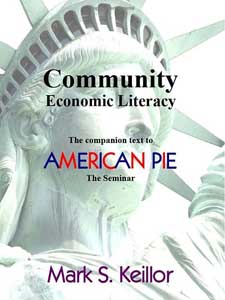DECEMBER 14, 2011
Book to help economy at grass roots level
 People can work to make their communities more economically viable and the community will reward them with jobs and income. This is the premise of a new book by author Mark Keillor aimed at empowering individuals and communities to overcome the current economic crisis. The book, Community Economic Literacy, is written and presented in such a way that the general public can be active participants in efforts to establish a more promising and productive local economic future.
People can work to make their communities more economically viable and the community will reward them with jobs and income. This is the premise of a new book by author Mark Keillor aimed at empowering individuals and communities to overcome the current economic crisis. The book, Community Economic Literacy, is written and presented in such a way that the general public can be active participants in efforts to establish a more promising and productive local economic future.
“It is obvious that cities and towns and the people who live in them will not be getting any meaningful economic assistance from Washington”, says Keillor. “It is our duty to this and future generations to revert to our American roots and shore up our local economies and build them back up to acceptable levels”. The author spent more than 25 years working in community and economic development and believes that there is much to be gained from understanding and practicing simple economic principles. “One of the most basic principles is to understand how much and how easily money leaks out of our community” he says. “Given the declining state of manufacturing and business downsizing, it is extremely difficult to replace that revenue”.
The book is based on the American Pie Seminar, the author’s interactive experience to teach civics and local economics to the general public. The seminar has been granted a provisional patent by the U.S. Patent and Trademark Office.
Keillor’s book describes the many ways that money comes into and leaks out of the community. He says that it is not just a matter of balancing the income and the leakage, but making sure that the income exceeds the leakage. Community income is generated when products and services are sold to outside markets or customers. Economic leakages can occur from personal shopping habits, businesses whose focus is too local, and such expenditures as college tuition. The more money we can keep in the community, the more there is available for growing existing local businesses, creating new business, improving schools and other public services, and keeping taxes low. Mr. Keillor asserts that the community treasury is no different from our personal bank accounts. If there is at least a balance, and preferably a surplus, we have choices for how to spend our money. If we are in a deficit, or overdrawn, our first obligation is to pay the debt and sacrifice everything else.
Community Economic Literacy includes more than 100 charts, diagrams, and pictures to illustrate basic economic principles. The book offers easy-to-understand examples from manufacturing, agriculture, retailing, job creation, and American history. It also includes a detailed section on the national debt explaining its origins and use, and misuse. It also compares the debt to other economic and social trends over the last 50 years. This helps explain many of the changes we have seen in our country and identifies areas where reform is needed.
Community Economic Literacy can be previewed and purchased at Amazon.com and other select retailers.




